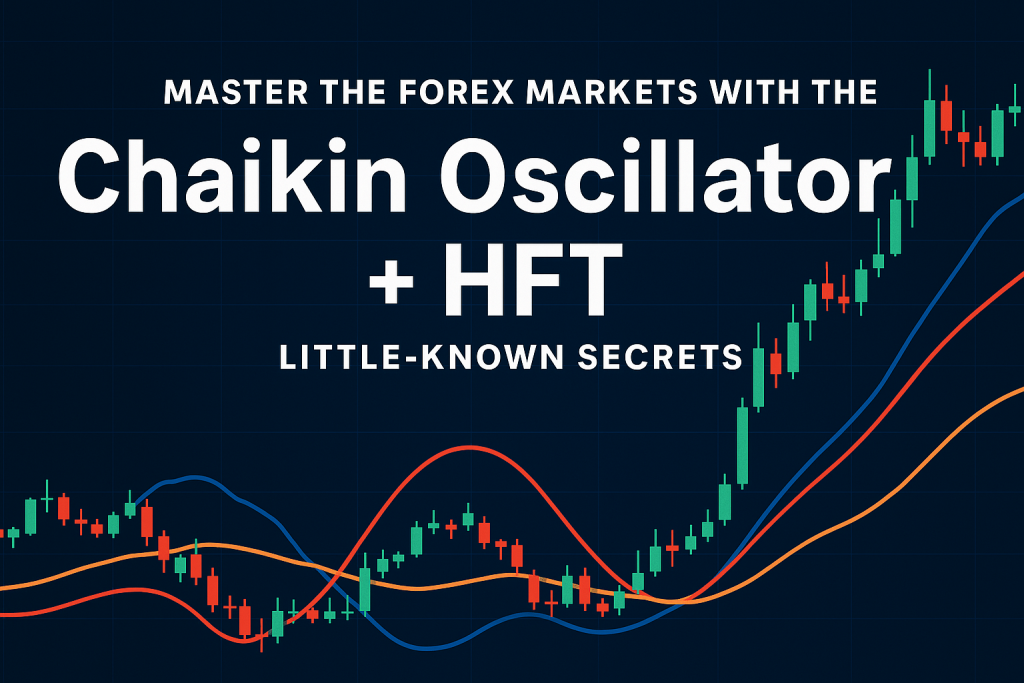Why HFT Quants Are Secretly Obsessed With the Chaikin Oscillator (And What That Means for You)

Picture this: you’re watching the market, your coffee is lukewarm, and suddenly price jumps like it got stung by a bee. No news. No major event. Just a rogue spike that makes you question if your MetaTrader has been possessed. Odds are, a high-frequency trading (HFT) algorithm just flexed its muscles—and what most traders miss is that some of these HFT bots quietly reference one old-school tool in their arsenal: the Chaikin Oscillator.
Yes. The same indicator that looks like it time-traveled from a Commodore 64 terminal is now influencing trades faster than your Wi-Fi can load cat videos.
But here’s where the real magic happens: if you understand how HFT bots leverage the Chaikin Oscillator, you unlock ninja-level timing precision and a deeper understanding of market microstructure.
The Chaikin-HFT Connection: More Than Just Old-School Quirk
Let’s break a myth right off the bat: HFT isn’t just about lightning-speed execution. It’s about anticipating liquidity flows with surgical precision. The Chaikin Oscillator, which combines price action and volume to forecast accumulation and distribution, gives smart machines a sneak peek at where orders are clustering—often before you even see it.
Why does this matter?
Because in the blink-and-you’ll-miss-it world of HFT, knowing where big players are hiding their intentions is pure gold. Many algo traders program micro-variations of the Chaikin Oscillator into their signal stack, not because it’s sexy, but because it quietly exposes volume-weighted sentiment in real time.
Insider tip: Combine this with VWAP deviation on micro timeframes, and you’ve got a digital heat map of where liquidity pools are hiding.
“Liquidity Whisperer”: What the Chaikin Oscillator Sees That Others Miss
Volume is the oxygen of price. And while RSI and MACD are busy checking the market’s temperature, Chaikin is checking its blood pressure.
Think of the Chaikin Oscillator like that old trader who doesn’t talk much but somehow always enters the market five minutes before the big move. It sees:
- Accumulation vs. distribution pressure
- Subtle shifts in institutional order flow
- Volume anomalies hidden behind slow price action
Most traders wait for confirmation. HFTs, however, act on probability, and Chaikin’s ability to sniff out shifting volume sentiment gives them just enough signal edge to fire first.
Pro move: Watch for divergence between price and the oscillator on the 5-minute chart during low-volume sessions. If it aligns with order book depth thinning, brace for impact.
The “Ghost Print” Phenomenon: When Volume Lies
Have you ever seen a candle print and then mysteriously vanish? Congrats, you’ve just witnessed a ghost print—a glitch or canceled order that leaves a volume footprint without price confirmation. Here’s the kicker: Chaikin picks up on that phantom volume.
Why should you care?
Because HFTs sure do. They monitor microstructural glitches like these and feed them into ML models to predict short-term liquidity voids. If the Chaikin Oscillator suddenly spikes with no price movement, it could be echoing a ghost print—and algorithms may be preparing to exploit that gap.
Use case:
- Compare Chaikin activity to cumulative delta and time & sales.
- If the oscillator jumps but delta stays flat, you might be seeing phantom liquidity.
- Expect algorithms to target that zone within the next few ticks.
The Tactical Combo: How Elite Traders Fuse Chaikin with HFT Tactics
You don’t need a $2M co-location server to trade like an HFT. What you need is insight. Here’s how advanced traders are mimicking HFT logic using the Chaikin Oscillator:
Step-by-Step Ninja Tactic:
- Timeframe: Use 1-minute and 5-minute charts for Chaikin Oscillator.
- Confirmation: Overlay with VWAP bands and OBV (On-Balance Volume).
- Trigger Zone: Look for Chaikin divergence + VWAP reversion + OBV volume thrust.
- Entry: Place a limit order at the VWAP reversion level.
- Risk: Set tight stop-loss just below recent microstructure support.
- Exit: Target 2:1 RR or wait for Chaikin momentum to flatten.
Underground twist: Add a latency meter to your order flow dashboard. If latency spikes during oscillator divergence, HFTs may be circling. Get in before they flash fill.
Case Study: GBP/JPY During the London Open
In October 2024, during a sleepy Monday London open, GBP/JPY printed a clean double-bottom. But something odd happened: volume surged on the second bottom, yet price barely moved.
Savvy traders using the Chaikin Oscillator caught the uptick in accumulation pressure. Meanwhile, HFT bots kicked in milliseconds later, exploiting retail hesitation.
Outcome? The pair surged 42 pips in 8 minutes. Traders who recognized Chaikin’s signal early rode the move. Those relying on RSI were still rubbing the sleep out of their eyes.
Lesson? The oscillator didn’t just react. It forecasted.
Avoiding the Pitfalls: Common Misuses of Chaikin in a High-Speed World
Let’s debunk a few Chaikin myths before they cause damage:
- Myth: It’s a lagging indicator.
- Truth: On small timeframes, with order flow overlays, it can act as a real-time sentiment proxy.
- Myth: It’s too simple for modern markets.
- Truth: Simplicity is exactly why algos love it. Clean signals. Low noise.
- Myth: It doesn’t work in volatile markets.
- Truth: That’s where it thrives. Especially when volume and price are misaligned.
Instead of chasing every flashy tool, master this one like a scalpel.
Elite Tactics Recap: What You Just Unlocked
- How HFTs use Chaikin to detect micro-volume shifts and liquidity imbalances
- The secret of ghost prints and how they impact short-term trading
- Ninja-level combo strategy using Chaikin + VWAP + OBV
- Why simplicity beats complexity in the hands of an informed trader
- How to catch early accumulation with a 5-minute divergence setup
Your Next Steps to Trade Like a Machine (Without Becoming One)
If this made your trading brain buzz with excitement (or existential dread), you’re not alone. But here’s the good news: you don’t need to out-code Citadel to get ahead. You just need better tools and sharper insights:
- Want real-time market updates and economic triggers? Check our Forex News Hub
- Looking to deepen your skillset with no fluff? Explore free Forex courses
- Craving battle-tested tools that work? Download our Smart Trading Tool
- Want a pro-grade trading journal to refine your edge? Grab it here for free
And if you want to hang out with other elite traders who speak your language? Join our community and let’s go deep.
—————–
Image Credits: Cover image at the top is AI-generated
PLEASE NOTE: This is not trading advice. It is educational content. Markets are influenced by numerous factors, and their reactions can vary each time.

Anne Durrell & Mo
About the Author
Anne Durrell (aka Anne Abouzeid), a former teacher, has a unique talent for transforming complex Forex concepts into something easy, accessible, and even fun. With a blend of humor and in-depth market insight, Anne makes learning about Forex both enlightening and entertaining. She began her trading journey alongside her husband, Mohamed Abouzeid, and they have now been trading full-time for over 12 years.
Anne loves writing and sharing her expertise. For those new to trading, she provides a variety of free forex courses on StarseedFX. If you enjoy the content and want to support her work, consider joining The StarseedFX Community, where you will get daily market insights and trading alerts.
Share This Articles
Recent Articles
The GBP/NZD Magic Trick: How Genetic Algorithms Can Transform Your Forex Strategy
The British Pound-New Zealand Dollar: Genetic Algorithms and the Hidden Forces Shaping Currency Pairs
Chande Momentum Oscillator Hack for AUD/JPY
The Forgotten Momentum Trick That’s Quietly Dominating AUD/JPY Why Most Traders Miss the Signal
Bearish Market Hack HFT Firms Hope You’ll Never Learn
The One Bearish Market Hack High Frequency Traders Don't Want You to Know The

